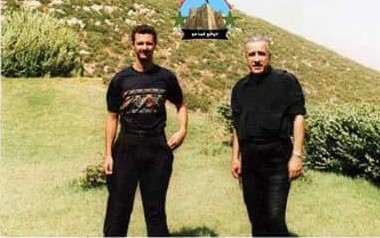PHOTO: A young Bashar al-Assad and long-time Assad confidante Mohammad Nasif Kheirbek
The news was almost unnoticed beyond specialist outlets on Syria’s conflict. Major General Mohammad Nasif Kheirbek — right-hand man to President Hafez al-Assad, “2nd father” and trusted aide to Bashar al-Assad, and liaison with Iran and Hezbollah — died on June 28, eight years after he was diagnosed with prostate cancer.
Nasif, 78, was active as an advisor until February when he was transferred to the American Hospital in Beirut in last February. Up to that point, as the “Deputy Vice President for Security Affairs”, he was Assad’s analyst of regional affairs and the “point man” for the relationship with Tehran and Iran-supported militias.
Born to a poor Alawite family in Hama Province, Nasif’s path to influence came through the army, the only institution that could offer him a monthly salary when he did not complete secondary education. When Hafez al-Assad returned to the military after a 1963 coup, he selected Nasif as an aide.
Promoted from non-commissioned ranks to become an officer, Nasif established himself in Army Intelligence. He sided with al-Assad in the 1970 coup that overthrew Saleh Jadid, and became the new President’s closest advisor. He was one of very few staff who could contact Assad by phone and to visit him at any time.
Nasif helped the President suppress the Muslim Brotherhood’s rising of the early 1980s, and he played an important role in defending an ill Assad against a coup attempt by Hafez’s brother Rifaat in 1984, before taking up his liaison position with Iran and Lebanese Shia militias, including Hezbollah.
Rumors said Nasif was “Secretary-General of the secret highest council of the Alawite sect”. Officially, he was given the formal title of Deputy Director of the General Security Directorate in 1999.
When Bashar al-Assad became President in 2000 upon his father’s death, Nasif was out of favor — Bashar was still angry over Nasif’s disclosure to Hafez al-Assad of the relationship between Bashar’s sister Bushra and her future husband, Assef Shawkat. However, his political talents meant that he was soon rehabilitated, with the title of Deputy Vice-President for Security Affairs in 2005. Two years later, his prominence was being recognized by the US, which froze his assets because of his links with “international terrorism”, Syria’s pursuit of chemical and nuclear weapons of mass destruction, and the Assad regime’s intervention in Iraq.
In 2011, questions over Nasif’s health and age were set aside with the beginning of the Syrian uprising. He became one of Assad’s chief security advisors, renewing his links with Hezbollah and Iran, including the head of the elite Qods Force, Qassem Soleimani. Although he continued to work in the political and militiry shadows, he was sanctioned in May 2011 by the European Union for the use of violence against protesters.
Nasif’s life in the shadows was matched by his reputation as a “man of few words” — and those words always spoken politely — who rarely left the office.
That lack of a public profile may give his Assad patrons a final benefit, even as they try to cover the loss of Nasif’s political ability. Few may realize the impact of his death for a regime trying to hold up against rebel advances, the threat of the Islamic State, and economic crisis.

